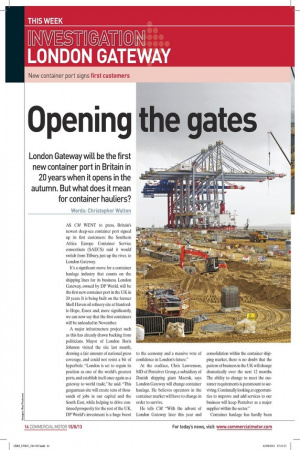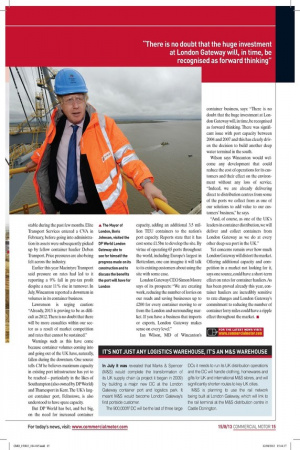THIS WEEK
Page 12

Page 13

If you've noticed an error in this article please click here to report it so we can fix it.
1111YSI-119 1-1101
LONDON GATEWAY
New container port signs first customers
Opening the gates I
London Gateway will be the first new container port in Britain in 20 years when it opens in the autumn. But what does it mean for container hauliers? Words: Christopher Walton
AS CM WENT to press, Britain's newest deep-sea container port signed up its first customers: the Southern Africa Europe Container Service consortium (SAECS) said it would switch from Tilbury, just up the river, to London Gateway.
It's a significant move for a container haulage industry that counts on the shipping lines for its business. London Gateway, owned by DP World, will be the first new container port in the UK in 20 years. It is being built on the former Shell Haven oil refinery site at Stanfordle-Hope, Essex and, more significantly, we can now say that the first containers will be unloaded in November. A major infrastructure project such as this has already drawn backing from politicians. Mayor of London Boris Johnson visited the site last month, drawing a fair amount of national press coverage, and could not resist a bit of hyperbole. "London is set to regain its position as one of the world's greatest ports, and establish itself once again as a gateway to world trade," he said. "This gargantuan site will create tens of thousands of jobs in our capital and the South East, while helping to drive continued prosperity for the rest of the UK. DP World's investment is a huge boost
to the economy and a massive vote of confidence in London's future."
At the coalface, Chris Lawrenson, MD of Pentalver Group, a subsidiary of Danish shipping giant Maersk, says London Gateway will change container haulage. He believes operators in the container market will have to change in order to survive. He tells CM: "With the advent of London Gateway later this year and
consolidation within the container shipping market, there is no doubt that the pattern of business in the UK will change dramatically over the next 12 months. The ability to change to meet the customer requirements is paramount to surviving. Continually looking at opportunities to improve and add services to our business will keep Pentalver as a major supplier within the sector." Container haulage has hardly been
stable during the past few months. Elite Transport Services entered a CVA in February, before going into administration its assets were subsequently picked up by fellow container haulier Deben Transport. Price pressures are also being felt across the industry.
Earlier this year Macintyre Transport said pressure on rates had led to it reporting a 9% fall in pre-tax profit despite a near 11% rise in turnover. In July,Wincanton reported a downturn in volumes in its container business.
Lawrenson is urging caution: "Already, 2013 is proving to be as difficult as 2012. There is no doubt that there will be more casualties within our sector as a result of market competition and rates that cannot be sustained."
Warnings such as this have come because container volumes coming into and going out of the UK have, naturally, fallen during the downturn. One source tells CM he believes maximum capacity in existing port infrastructure has yet to be reached — particularly in the likes of Southampton (also owned by DP World) and Thamesport in Kent. The UK's largest container port, Felixstowe, is also understood to have spare capacity. But DP World has bet, and bet big, on the need for increased container
capacity, adding an additional 3.5 million TEU containers to the nation's port capacity. Reports state that it has cost some £1.5bn to develop the site. By virtue of operating 65 ports throughout the world, including Europe's largest in Rotterdam, one can imagine it will talk to its existing customers about using the site with some ease.
London Gateway CEO Simon Moore says of its prospects: "We are creating work, reducing the number of lorries on our roads and saving businesses up to £200 for every container moving to or from the London and surrounding market. If you have a business that imports or exports, London Gateway makes sense on every level." Ian Wilson, MD of Wincanton's
container business, says: "There is no doubt that the huge investment at London Gateway will, in time, be recognised as forward thinking. There was significant issue with port capacity between 2004 and 2007 and this has clearly driven the decision to build another deep water terminal in the south.
Wilson says Wincanton would welcome any development that could reduce the cost of operations for its customers and their effect on the environment without any loss of service. "Indeed, we are already delivering direct to distribution centres from some of the ports we collect from as one of our solutions to add value to our customers' business," he says.
"And, of course, as one of the UK's leaders in container distribution, we will deliver and collect containers from London Gateway as we do at every other deep sea port in the UK." Yet concerns remain over how much London Gateway will distort the market. Offering additional capacity and competition in a market not looking for it, says one source, could have a short-term effect on rates for container hauliers. As has been proved already this year, container hauliers are incredibly sensitive to rate changes and London Gateway's commitment to reducing the number of container lorry miles could have a ripple effect throughout the market. •











































